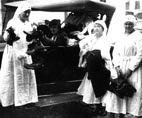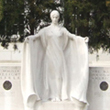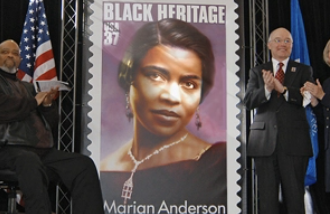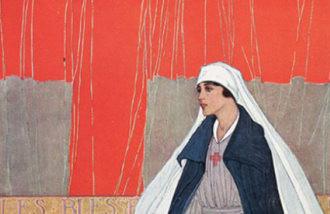The DAR has several special collections that are formed from a certain type of work or a certain subject area. All of these collections are listed in the DAR Library Catalog and are available for use at the DAR Library.
American Indian Collection
The DAR has long had an interest in Native Americans. The DAR American Indians Committee, established in 1936, “provides financial assistance and educational aid to Native American youth” through support of several schools and with a scholarship program. With this activity as background, the DAR Library established a special collection in 1987 designed to assist with Native American research using existing holdings and newly donated materials. It has continued to expand since its inception. Now numbering some 2,000 volumes, the American Indian Collection provides historical and genealogical information on first peoples across the United States.
While the focus of this collection is general history and culture, genealogical studies and guidebooks are becoming more numerous. Researchers will find histories of specific Native American nations, state studies, and materials on interactions with European and African settlers. There are six shelves concerning the Cherokee alone. In addition to the special collection itself, much information on Native Americans can be found throughout the main Library collection under the states and their counties.
The American Indian Collection supplements another nearby gathering of materials on Native Americans, the Natural Resources Library at the Department of the Interior. This library is open to the public but does not circulate books. It’s holdings on American Indians are quiet extensive and contain many valuable materials for genealogical research.
American Women’s History Collection
As a major women’s organization, the DAR has collected women’s history materials for many years. In the late 1980s, the Library began to develop an organized women’s history collection using existing holdings and new publications. The assembled materials focus on the role played by women in the development of the United States, the women’s rights movement of the nineteenth and early twentieth centuries, and histories of women in the various states. Records relating to women in American history are found throughout the DAR collections. A natural focus of the American Women’s History Collection is women’s experiences during the period of the American Revolution. Other books examine legal, cultural, and family ties in broad social context.
DAR Library File Collection
The DAR Library’s file collection is a mixture of materials donated by DAR members or by the public. Innumerable Bible records, family studies, pamphlets, research notes and other unbound materials are included. The richness and variety of the collection covers the entire United States and concentrates on the eighteenth, nineteenth, and early twentieth centuries, with significant colonial records as well.
Genealogical Records Committee Collection
Numbering some 20,000 typescript volumes, the Genealogical Records Committee Reports, as they are collectively called, comprise one of the most important and unique parts of the DAR Library’s holdings. DAR members have gathered and submitted these unpublished compilations of Bible, cemetery, family, vital, county, town, church, and military records since the late 1910s. The pre-1972 books were microfilmed by the Genealogical Society of Utah on nearly 3,000 microfilm rolls, but a greater number have arrived since this filming. Because the work of the Genealogical Records Committee is ongoing, users of the Library should expect to find new material throughout the year.
State DAR societies may also place copies of their reports in a library or libraries in that state. Frequently, these will be in the state library, historical society, or a major public library. Sometimes there is a small State DAR Library.
The DAR Library in Washington is the only research center owning nearly all of the Genealogical Records Committee Reports comprising the national set. Approximately 100-125 new books arrive each year. These Reports are included in the DAR Library Catalog, and many of these catalog entries include extensive contents notes that are searchable in the catalog.
The majority of the GRCs have been scanned and indexed. The every-name GRC index is accessible through the GRC index search tab in the Genealogical Research System (GRS). The scanned GRCs can be viewed in the Library’s Seimes Technology Center.
Manuscript Collection
The Manuscripts Collection in the DAR Library is comprised of over 3,000 collections related to genealogy, family history, and American history. A large portion of the Collection includes family Bibles with family records documenting births, deaths, and marriages, and family Bible records donated without the full Bible. The Collection includes several large aggregate collections, such as the File Case Collection, the Miscellaneous Manuscripts Collection, and the Miscellaneous Bible Records Collection, which were compiled from different sources and organized to facilitate management and use. In general, collections have come to the DAR Library through generous donations from DAR Members and DAR Chapters, the public, and genealogical societies. For example, the National Genealogical Society donated over 150 linear feet of genealogical manuscript materials in 2004, with subsequent donations in 2008, 2011, and 2014, which have led to the creation of over 70 discrete collections. Collections have also been created from transfers of original supporting documentation from member applications.
Today, all donations require prior approval and signed Deeds of Gift, and collection records endeavor to document provenance whenever possible. The Manuscripts Collection continues to update its record descriptions and comply with archival best practices and standards to arrange, preserve, and describe holdings, and to better support research and access.
All collections, once cataloged, are discoverable via the DAR Library Catalog available online. Collections are available for research use by request at the DAR Library, Monday-Friday, 8:30-4pm, and Saturday, 9-5pm.
All donations must be approved by the Manuscripts and Special Collections Librarian and include a signed Deed of Gift. See the Manuscripts Collecting Guidelines for types of materials accepted.
National Huguenot Society Collection
In 2002, the National Huguenot Society (NHS) donated its books to the DAR Library. The resulting “National Huguenot Society Collection” of over 500 volumes supplements existing materials at the DAR on the role of French Protestants in the settlement and growth of the American colonies and the United States and on their European backgrounds.
Members of the NHS continue to donate materials to this collection or funds for the DAR Library to use for the purchase of Huguenot related publications and sources. All items in the collection are cataloged and the records of these volumes appear in the DAR Library Catalog.
United States Ephemera Collection
Since the beginnings of the DAR Library in the 1890s, members and the public have donated small pamphlets, booklets, newspaper clippings, typescripts, and manuscripts. The diversity of this material covers all areas of the United States, many American families, and untold numbers of subject areas. This material was cataloged and arranged as the United States Ephemera Collection. “Ephemera,” in library terms, may be defined to cover the vast array of “odds and ends” of information sources which defy easy placement on a bookshelf, in a microfilm drawer, or in an existing manuscript collection. The items in this collection appear in the main on-line catalog and should be requested at the reference desk.
W.P.A. Collection
The DAR Library owns about 1,200 volumes of the publications of the Historical Records Survey of the Works Progress Administration (later the Works Projects Administration). Because of the DAR’s involvement at the local level in supporting the work of the W.P.A during its lifetime from 1935 to 1942, the W.P.A. donated many of its publications to the DAR Library.
The majority of the published volumes are in the series “Inventory of the County Archives.” These inventories of county records list local records found in courthouses in the states at the time the survey was completed. Not all counties in every state have a published inventory. Even if a county of interest is not available, researchers may wish to review an inventory for another county as a representative example of the types of records which should be in any county in that state. Many of the publications have useful introductions and discussions of records and record-keeping practices.
Portions of other W.P.A. series are available in the Library’s special “W.P.A. Collection.” These include inventories of federal records in the states, calendars of manuscript collections, guides to the records of religious bodies, and indices to a few newspapers. All are of potential value to genealogists and should not be overlooked.
Separate from the special collection of W.P.A. materials, researchers will also encounter many transcriptions of records at the county level prepared by the W.P.A.’s Historical Records Survey. Several state sections, particularly Michigan, Tennessee, and West Virginia, include numerous such volumes.








